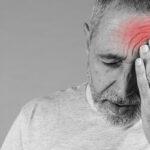Headaches from Lack of Sleep: Types, Causes, and Treatment
Headaches are one of the most common ailments reported by adults and children. Occasional headaches are usually of little concern, whereas persistent pain could be a sign of a more serious condition.
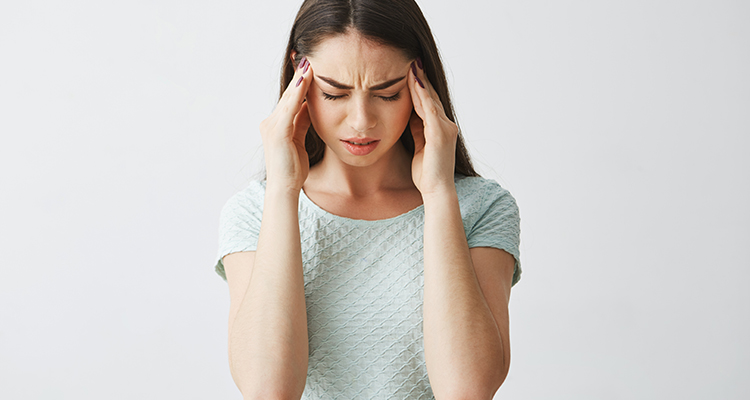
Most headaches are triggered by poor eyesight, stress, changing weather conditions, or illness. But for some people, headaches are a pesky side effect of lack of sleep. In today’s article, we’ll talk about headaches from lack of sleep including why they happen, what they feel like, and how to find relief.
Content
What Is a Sleep Deprivation Headache?
Lack of sleep is also categorized as sleep deprivation. Sleep deprivation means getting less sleep than recommended or required to function both cognitively and physically. The CDC recommends that adults get between 7 and 9 hours of sleep per not. Failing to do so for an extended period of time can result in sleep deprivation.

Side effects of lack of sleep include daytime drowsiness, cognitive impairment, slow reaction times, and mood swings. Lack of sleep can also trigger unpleasant headaches, referred to as sleep deprivation headaches or tension headaches. These headaches are caused by insufficient or interrupted sleep. Migraines are another common type of headache that may be a result of poor sleep hygiene.
Most people describe headaches from lack of sleep as a dull ache or pressure near the front of their heads and across the forehead. For some people, this pain travels to the sides and back of the head as well. Tightness or heaviness are two more words used to describe these types of headaches. Migraines caused by sleep deprivation come with their own set of symptoms including nausea, sensitivity to light and sound, and severe pain on one side of the head. Migraine headaches can last for hours or even days.
Signs of Sleep Deprivation
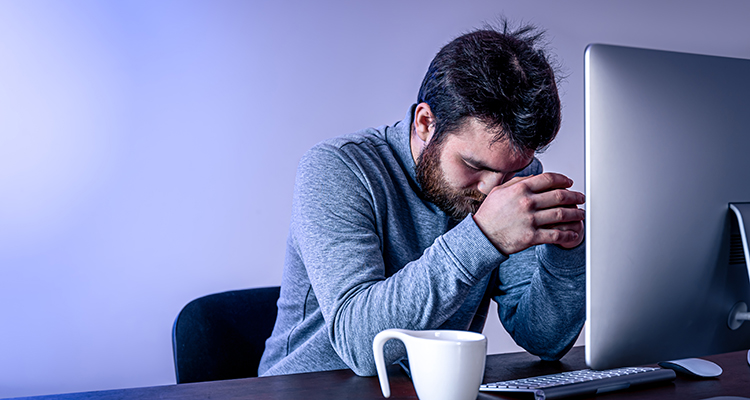
Headaches aren’t the only sign you’re not getting enough sleep. You may not even realize that the headaches you’re experiencing are due to a lack of sleep. But if you’re exhibiting any of these symptoms in combination with persistent headaches, it could be a sign that sleep deprivation is to blame.
- Reduced attention span
- Slowed thinking
- Lack of energy
- Impaired memory
- Poor decision making
- Slowed reaction times
- Anxiety
- Irritability
What Causes Sleep Deprivation?
Lack of sleep can happen for a myriad of reasons from time changes and travel or jet lag to stress, anxiety, medical issues, irregular work schedules, and other lifestyle changes. All of these factors are considered barriers to sleep that can reduce your sleep opportunities and increase your risk of experiencing headaches.
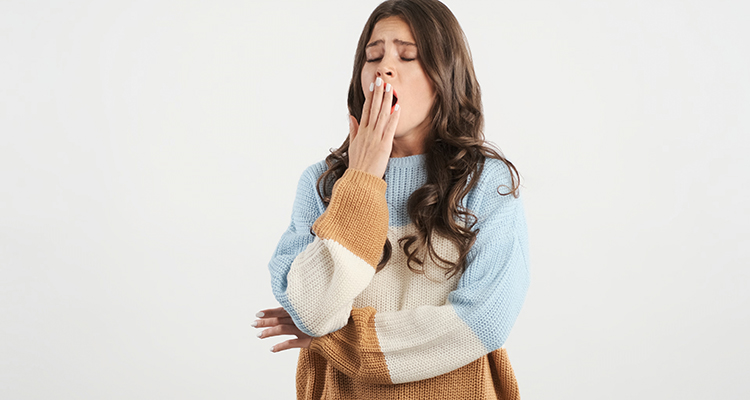
In some situations, people don’t have enough time to dedicate to sleep, while others have plenty of time but simply struggle to fall and stay asleep. Both can result in insufficient sleep totals, a lower threshold for pain, and a risk of several types of headaches and headache disorders. Other changes in your sleep patterns can also trigger headaches including getting too much sleep or sleeping in fragments.
The Connection Between Headaches, Sleep, and Pain
Countless studies have been done to determine the connection between headaches and sleep (or lack thereof). One 2011 study suggests that a lack of rapid eye movement (REM) sleep could result in more painful headaches. The results from this sleep study found that lack of sleep increases the production of certain proteins that cause chronic pain. These proteins are believed to reduce the body’s threshold for pain and, in some patients, sparked intense migraine headaches. A 2018 sleep review also linked sleep deprivation with an increased risk of tension headaches.
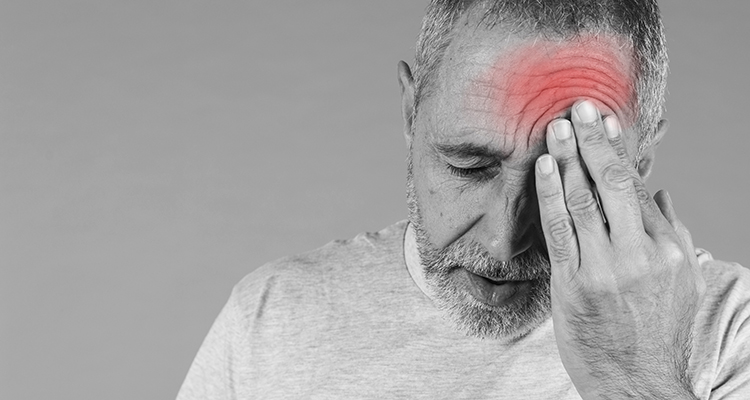
REM sleep is the deepest sleep stage and usually occurs between 90 and 120 minutes after you fall asleep. Most people experience between 3 and 5 REM cycles every night. REM sleep is also characterized by an increase in vivid dreams, faster breathing, involuntary body movements, and increased heart rate. REM sleep plays an important role in mood regulation, learning, and storing memories.
The connection between sleep and pain doesn’t end here. Another study conducted in 2015 showed increasing evidence that lack of sleep negatively impacts the human body’s ability to handle pain. Participants in the study suffering from insomnia also appeared to be more sensitive to pain. As a result, a mild headache that may not affect a well-rested individual could cause extreme discomfort for someone suffering from insomnia or sleep deprivation.
Specific Types of Sleep Deprivation Headaches
Science suggests that there are over 150 different types of headaches with a slew of causes and triggers. Most headaches fall into two categories – primary and secondary. Primary headaches have no known cause while secondary headaches are usually triggered by something else. That means headaches from lack of sleep are secondary. Here’s a closer look at the most common types of secondary headaches triggered by lack of sleep.
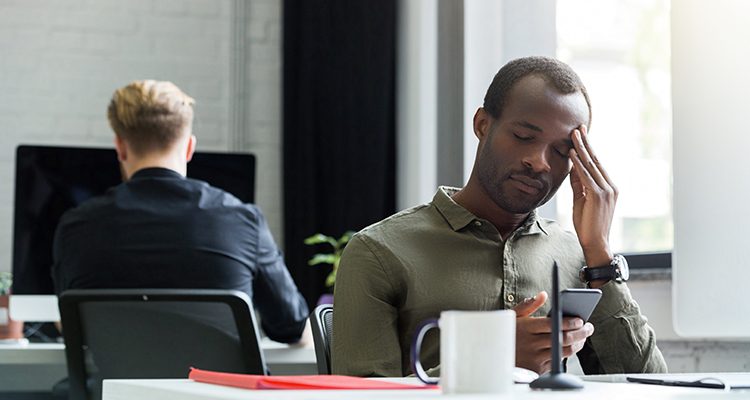
Migraines
Migraines are more than just intense headaches. They’re a specific type of headache that’s actually considered a neurological condition due to the effects it has on the brain. One theory is that migraine pain happens when groups of excitable brain cells experience a surge in activity waves. These waves trigger the production of certain chemicals that narrow blood vessels and impact communication between the brain and important nerve cells in the body.
Common symptoms of migraine headaches include:
- Extreme pain on either side of the head
- Dizziness
- Sensitivity to light and sound
- Visual disturbances (blurred vision, floating spots)
- Nausea and vomiting
Several studies have been done on the connection between migraines and sleep. Here are some of the most telling results.
- People who suffer from migraine headaches are 8 times more likely to suffer from a sleep disorder than those who don’t
- Both lack of sleep and too much sleep can trigger migraines
- Sleep disturbances can increase the frequency of migraines from fewer than 15 times per month (episodic) to more than 15 times per month (chronic)
- Individuals who suffer from sleep deprivation and insufficient sleep may experience more frequent and intense headaches
One reason for these findings is that migraines and sleep deprivation share brain mechanisms. One example is that the hypothalamus which is the part of the brain that regulates sleep and arousal also contains neurons responsible for regulating pain. The hypothalamus also contains the SCN (suprachiasmatic nucleus) which plays an important role in regulating the sleep-wake cycle and receiving light signals from the eyes. People with a damaged SCN may experience a disrupted sleep-wake cycle and erratic daytime sleep.
Another part of the brain connected to both sleep and pain is the pineal gland. This is where the sleep hormone melatonin is produced. In some studies, low levels of melatonin are linked with both migraines and cluster headaches. Some patients also reported waking up with headaches.
Similar to how too little sleep may trigger migraines, certain people may experience worse or more frequent migraines when they sleep too much. The phrase “weekend migraine” is used to describe people who experience frequent migraines on the weekends when they sleep longer and later, in an effort to make up for lost sleep during the week.
Migraine and sleep share a bidirectional relationship. Just as much as lack of sleep can trigger migraines, intense migraines can make it difficult or impossible to achieve a quality night’s sleep. You may also feel increasingly tired after experiencing an intense migraine that depletes your energy.
Tension Headaches
Tension headaches are fairly common and often affect both sides of the head. These headaches are described as a dull ache, tightness, or pressure. In some cases, tension headaches start at the front of the skull or across the forehead and circle around to the back of the head or neck. Tension headaches can be triggered by a variety of external factors but generally occur when muscles in the neck and scalp contract or become tense. These muscle contractions happen due to stress, depression, anxiety, or a head injury.
Similar to migraine headaches, research also suggests that the hypothalamus may play a role in tension headaches from lack of sleep plus a lower threshold for pain. Other studies suggest that frequent naps following a night of poor sleep could cause a tension headache the following day.
Cluster and Hypnic Headaches
Though rare, both cluster and hypnic headaches generally occur at night and may be connected to lack of sleep.
Cluster Headaches
Cluster headaches are said to be extremely painful and occur either at night or very early in the morning. Cluster headaches form around the eye area and are described as shooting pain. While these headaches don’t last as long as migraines (between 5 minutes and 2 hours), they can be debilitating.
Sleep experts believe that transitioning out of a dream state of sleep during your REM cycle could be the main trigger for cluster headache attacks but more research is needed. Other studies attribute these headaches to abnormalities in the body’s internal clock and the hypothalamus.
Hypnic Headaches
Hypnic headaches are also referred to as “alarm clock” headaches because they tend to wake the individual up from a dead sleep at the same time every night. Similar to cluster headaches, hypnic headaches don’t last very long but they’re still quite painful. Researchers believe these abnormal headaches may be caused by a lack of melatonin production in the body.
How to Treat Headaches from Lack of Sleep
Because each of these headaches manifests itself differently at different points in the day or night, each needs its own unique treatment approach. When one of these debilitating headaches strikes, here’s what you can do to lessen the effects and start feeling some relief.

Migraine Headache Treatment
Migraines are a special type of headache that require special treatment. They’re often more painful than tension headaches and need more aggressive action. The fastest and most efficient way to treat migraine headaches is with medication. Both prescription and OTC medicine can help ease symptoms and lessen the effects of even the most severe migraines.
Here are some of the most common pain relievers that are also proven most effective for treating migraine headache symptoms:
- Aspirin (Bufferin), acetaminophen (Tylenol), ibuprofen (Advil), and naproxen (Aleve)
- Medications specifically designed to treat migraines (like Excedrin Migraine) contain both aspirin and caffeine, which may help treat moderate to severe migraines
- Indomethacin comes in both an oral medication and suppository to help relieve migraine pain and nausea
- Triptans work to block certain pathways in the brain. By binding to serotonin receptors, triptans can decrease the swelling in your blood vessels and, in turn, reduce the pain associated with migraine headaches. Triptans are available in several different forms including a nasal spray, injection, and prescription pill. A single tablet dose of triptan (known as Treximet) has proven effective at reducing migraine symptoms in most patients.
- Anti-nausea medications like prochlorperazine (Compazine), chlorpromazine (Thorazine), and metoclopramide (Reglan) can help ease nausea and vomiting caused by migraines
- Ergots are a type of migraine medication that contains the drug ergotamine and caffeine. Similar to Excedrin Migraine, this type of medication works to constrict blood vessels and reduce both pressure and pain in the head. If your migraine lasts more than 48 hours, ergots can help. For the best results, take this medicine at the onset of the symptoms. Ergotamine isn’t without side effects and some people respond better to a different ergot medication known as dihydroergotamine.
- Opioids including those that contain codeine are commonly prescribed to patients who can’t take other migraine medications including ergots or triptans. Opioids can be habit-forming and, therefore, aren’t recommended for long-term use.
- Glucocorticoids such as dexamethasone and prednisone can also provide temporary migraine relief.
If you don’t want to take medication for your migraines or want to combine medication with other at-home remedies, here are a few techniques you can try.
- Relaxation and breathing techniques
- Apply a cool compress to the back of your neck
- Gently massage the painful areas of your forehead or temple
- Close your eyes and rest in a dark, quiet room
- Acupressure or acupuncture
- CBT (cognitive behavioral therapy)
- Supplements (magnesium, vitamin B-2, coenzyme Q10
Tension Headache Treatment
Similar to migraine headaches, both OTC and prescription medications can help reduce the pain and discomfort associated with tension headaches. These include, but aren’t limited to:
- Pain relievers (aspirin, ibuprofen, naproxen)
- Combine pain relievers and mild sedatives advertised as “nighttime” or “PM” relief
- Triptans (prescription drugs used for treating migraines)
In some cases, antidepressants and anticonvulsants are used to prevent tension headaches from lack of sleep.
At-home remedies for easing tension headaches include:
- Reduce stress and anxiety through exercise, meditation, therapy, and other relaxation techniques
- Apply cold or hot compresses to your forehead for 5 to 10 minutes
- Experiment with massage, acupuncture, and acupressure
Preventing Future Headaches From Lack of Sleep
Sometimes, the best defense is a strong offense. Although not all headaches are preventable, there are a few things you can do to reduce your risk of waking up with a nagging headache.

- Setting a consistent sleep schedule that involves going to be and waking up at the same times each day
- Creating an ideal sleep environment (a dark, quiet bedroom with quality bedding and a comfortable temperature)
- Exercise during the day, but not too close to bedtime
- Avoid drinking caffeine or alcohol too late in the day
- Avoid eating heavy or high-fat meals before bed
- Limit the use of electronics and exposure to blue light at night
- Increase exposure to light (both natural and artificial) during the daytime hours
- Create a bedtime routine or wind-down routine that helps you relax before sleep
- Don’t force yourself to go to sleep until you’re tired and avoid staying in bed awake for too long
- Limit fluid intake before bed to prevent frequent bathroom trips during the night
Many of these small lifestyle changes can have a big impact on your overall sleep quality and help prevent unwanted headaches and flare-ups.
Improve Your Sleep Habits and Overall Quality of Life
Leading a happy, healthy, and productive life goes hand-in-hand with getting enough sleep. When it comes to sleep, quality is as important as quantity. However, lack of sleep can cause a plethora of unpleasant side effects including headaches. By understanding the triggers and potential causes of these headaches, you can take quick action to ease symptoms and improve your sleep patterns.
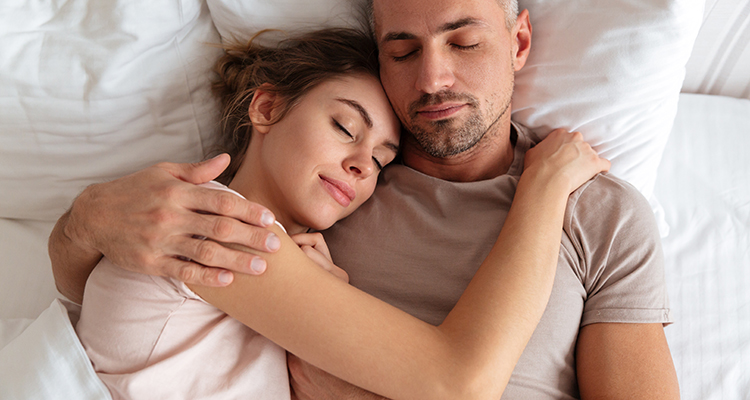
Another way to improve your sleep quality and overall quality of life is through CBTi. Using a combination of meditation, mindfulness, and reflection, you can kick your bad sleep habits and the unwanted side effects of sleep deprivation.
Click here to start your journey.




